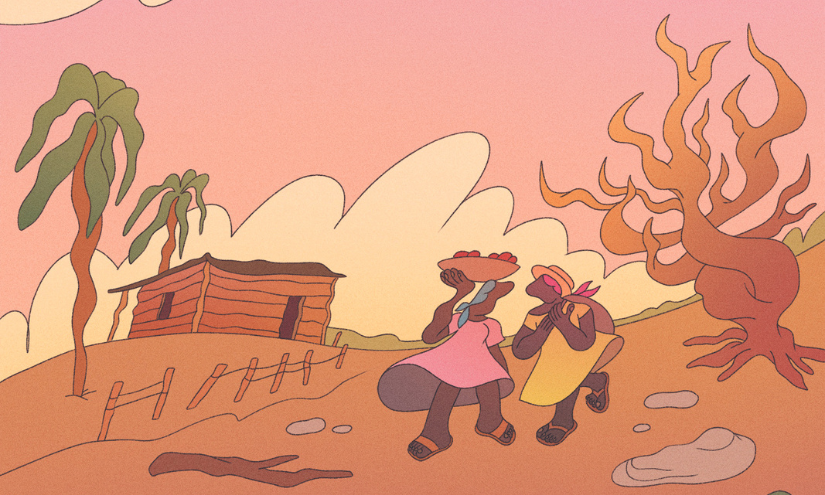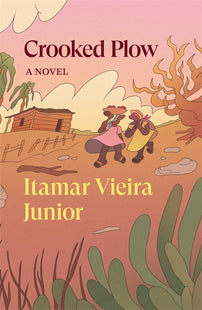Translating Crooked Plow
"When people speak of this book in Brazil, they speak of it not only as a published novel but as an event, a happening, something of national importance." — Johnny Lorenz, translator.

There is a moment in Itamar Vieira Junior’s Crooked Plow, during one of the festive rituals depicted in this beautiful, riveting novel, when an elderly woman begins singing. Her song is unfamiliar to the others. She begins dancing, too, flinging her arms as though casting an invisible net over the crowd.
She has been possessed by Santa Rita the Fisherwoman, an encantada, an Afro-Brazilian spirit being.
Some readers of Crooked Plow, which I had the honor of translating into English, will accept the possibility of spirit possession; some might even believe firmly in the phenomenon. Perhaps there are readers who will not accept, at all, the possibility of spirit possession. Others might suspend disbelief and approach the moment I described above as an engaging, but purely literary, artifice.
I’d like to suggest a way — not the way, of course; merely one way — of thinking about the experience of possession. To be possessed is to be taken over. To be taken over by something powerful, something you recognize but cannot fully comprehend.
It is an opening up of the self.
A book can do this to us, move through us, or more provocatively yet, it can move into us. We open the book, and the book opens us.
Crooked Plow (or Torto arado, in the original Brazilian Portuguese) was, and continues to be, a literary sensation in Brazil — a novel praised by critics, adored by readers. It received the Jabuti, Brazil’s greatest literary prize, for best novel. In 2021, it sold more copies in Brazil than any other work of fiction. But these facts do not quite capture the excitement around Torto arado. When people speak of this book in Brazil, they speak of it not only as a published novel but as an event, a happening, something of national importance.
As for me, when I experienced this book for the very first time, I felt as though I had been drawn into a ritual. Perhaps I had been. The first page of a book is a door, and when we cross that threshold, we step into this possibility: to be changed.
I read Torto arado in 2019, on my smart phone, with joy and anguish, on quiet nights after my family had gone to bed. I read it in New Jersey, where I live, before the book became a sensation in Brazil. (I am the son of Brazilian immigrants to the United States.) Torto arado had received the LeYa Prize in Portugal, where it was first published, and only later would it appear in bookstores across Brazil. I reached out to Itamar Vieira Junior immediately after reading Torto arado. I wanted to get to work right away; I simply had to translate this book.
I had recently finished translating a second novel by the great Clarice Lispector. I was looking for a project. At the time, I had been thinking a lot about the Black Lives Matter movement in America, how it might inform one’s work as a translator. (I recommend John Keene’s essay, Translating Poetry, Translating Blackness, an essay that addresses this very question).
It might seem unrelated, but I had been thinking about the land, too, this earth beneath us, how distant I’d become from the earth. My hands routinely touched my keyboard, my smart phone, myriad forms of plastic. My neighborhood is a rather sterile patchwork of suburban lawns. When I read the original version of Crooked Plow, it seemed to me a sort of antidote to the toxicity around me (a toxicity both literal and psychological). I discovered in Crooked Plow an astonishing story — and it is a story told by women with dirt under their nails, with the scent of sweat and sacred herbs clinging to their flesh.
One of the dominant images, perhaps the dominant image, of Crooked Plow is the glimmering knife with the ivory handle. A knife wielded by two young girls, sisters too eager to explore its “strange, forbidden radiance.” On every page of the book, the lines of prose are very much like the edge of that blade: humming with beauty and violence.
I am reminded of the father, farmer and healer, Zeca Chapéu Grande, an important figure in this book. He has a lesson to teach, and though it was not meant to be a lesson in translation, nevertheless it seems to me relevant to my work. Here is how Zeca’s daughter describes her father as he applies himself in the fields:
Whenever he encountered some problem in the fields, my father would lie on the ground, his ear attuned to what was deep in the earth, before deciding what tools to use and what to do, where to advance and where to retreat.
Like a doctor listening to a heartbeat.
There is a powerful lesson here: to listen quietly to the earth. Or to a text. As I worked on my translation, I also began planting a vegetable garden behind our house.
My work as a translator not only brought me closer to the text, it brought me closer to Itamar Vieira Junior, who has been so very generous and patient with my questions. As Crooked Plow is about to be published in English, Itamar and I still have not met in person; our conversations (so far) have taken place through instant messaging, emails and video conferencing. Specific images in Crooked Plow, the local flora and fauna, regional dishes — these were rich topics of discussion for us, but so, too, were (if I might put it this way) the “specific ambiguities.” A cryptic message from an encantada to Bibiana. The piercing cries of a woman in the book’s final chapter. The sensual work of one woman braiding another woman’s hair. Sometimes I wasn’t quite sure about something, and Itamar would be pleased by my uncertainty. My uncertainty was correct.
It might seem paradoxical, but a translator must be precise regarding what is not said.
Late spring, 2020: COVID was raging, and my family was in lockdown. I was working on a very early draft of my translation of Crooked Plow, before it had received generous support from the National Endowment for the Arts, before Verso (an early believer in Crooked Plow) had purchased the rights in English. I stepped away from my draft to visit the vegetable garden behind our house. It was getting started, too; nothing much to see yet. As I cleared a pile of dead leaves from the garden bed, I suddenly realized I was holding a snake, camouflaged, so alive, writhing in my hands.
A good sign.
—Johnny Lorenz is a translator of Brazilian literature, poet, literary critic and professor of English at Montclair State University. His book of poems, Education by Windows, was published by Poets & Traitors Press. His translation of Clarice Lispector's A Breath of Life was a finalist for Best Translated Book Award and his translation of Lispector's The Besieged City was listed as one of the "Best Books of 2019" by Vanity Fair. His honors include a PEN/Heim Translation Fund Grant, a Fulbright, and, most recently, a grant from the National Endowment for the Arts to support his translation of Crooked Plow by Itamar Vieira Junior.
Crooked Plow by Itamar Vieira Junior, translated by Johnny Lorenz, is out now.
[book-strip index="1" style="buy"]
